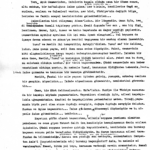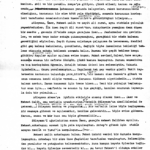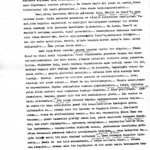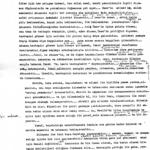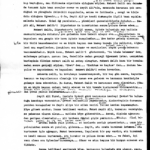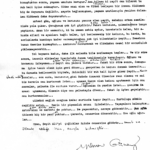Shortened, English translation
Six Turkish prisoners are on their way home during a one-week leave. They have diverse social backgrounds. Each of them has own problems, sorrows and longings. Their limited prison leave is going to lead them to the most remote places of Turkey.
Süleyman is a no-good from Adana. Indifferent to everything which does not concern himself directly. The only things that are worth living according to him are alcohol, drugs, gambling, and women. Released from prison, he begins to drink right away. He will keep drinking throughout the journey and once arriving in Adana he will barely be able to stand on his feet…
Yusuf from Gaziantep is a naive young man. Still a child, he got married and went to prison shortly after. While incarcerated no one tells him about the death of his wife, as no one dares to deliver such a sad message. Full of hope and longing and carrying a canary as a present for his beloved wife he is heading home…
Mevlüt, a compatriot of Yusuf, comes from a most traditional and feudal environment. Yet, he is a gentle, nice young man, who was already engaged before being imprisoned. He is going to see his fiancée and his homeland…
Ömer is a young Kurd from Urfa. He lives in a smugglers’ village near the Turkish-Syrian border. He has been imprisoned for smuggling. As his family has no land and no property, smuggling remains their sole income. He loves nature and often dreams of riding across the wide and fertile lands on the back of a white horse. He is a most silent person. And above all he is determined not to return to prison after the his leave ends…
Mehmet Salih was sentenced to several years in prison as he took part as the driver in an armed robbery. His brother-in-law Aziz, who committed the robbery, was caught and shot by the police while Mehmet managed to escape. His wife and above all her family is well aware of this. Has there ever been any chance for Mehmet to save his brother-in-law? Aziz’s family wants to know. Shall he lie or rather tell the truth? Will his wife leave him when she learns the truth? The grieve that these questions cause weigh heavy on him and he will not be able to get rid of them until his arrival. First he is visiting a friend in Adana to ask for advice…
Seyit Ali Firat, also a young Kurd, is married and the father of one child. His conduct and overall mentality are overshadowed by the feudal structures that he comes from. On his way to Konya, the home of his family, he still does not know that his wife has run away. But her brothers have brought her back to her village in Siirt…
Süleyman, Ömer, Mehmet Salih and Seyit Ali travel on the same bus. Seyit Ali is the first to get off. It’s midnight, the time of curfew. At the bus stop the police keeps him back and sends him to the waiting hall. He has to stay there with other travellers until 5 o’clock in the morning. It feels to him like a prison camp as his family’s home is just a few steps away. Desperately but without any success he tries to explain himself to the officers. As soon as the doors open at 5 in the morning he rushes home. But his excitement and joy at once turn into despair and revulsion as his mother tells him the truth about his wife. Similarly, his father has
left home and married another woman. Seyit Ali is close to breakdown. His honour has been deeply injured. And there is only one way out: he needs to get to his wife and punish her himself. The road ahead is going to be long and burdensome. A new journey will begin for him, full of torment, pain and aversion and above all turmoil against his burdened honour…
Süleyman already has fallen asleep in the bus under the impact of the alcohol. He is fighting his friends as they try to get him out of the bus. He feels filthy and exhausted. There is no way he can go to his wife in such a state. He decides to visit a hammam before going home. His wife and his children are already waiting…
Mehmet Salih goes to see his friend from whom he seeks advice and finds him in a saddening state. He has been attacked by fascists shortly before and now lies injured in bed. Despite his injuries, his friend seems to be full of extraordinary strength, vitality, and love for his own life. Mehmet Salih begins to tell him the truth about the robbery: it was true, that he was struck by fear and left his brotherin-law behind. If he had not been running away and instead warned him, they might have been arrested together and there would not have been a gunfight. His brother-in-law would have been convicted as well, but at least he would still be alive! His friend advices him to tell the truth about what happened. If he was guilty of his brother-in-law’s death, it was his duty to confess. Maybe his wife would understand. Mehmet Salih leaves his friend totally convinced to tell his wife the truth. He rushes to the train station and catches the train. It just so happens that Seyit Ali is on the same train. They do not see each other first. But they are going to meet…
Ömer, Mevlüt and Yusuf travel on the same bus passing Gaziantep to Urfa. On the highway the police stops the bus in order to check the passengers’ ID’s. All men are required to step off the bus to be searched. Yusuf has lost his leave permit. As he is not able to identify himself, he is being arrested. Even Mevlüt and Ömer are of no use to him. Still no one has told Yusuf about the death of his wife. Before the bus takes off without Yusuf, he gives Mevlüt the canary and asks him to give it to his wife. Sadly they say good-bye to each other…
Mevlüt, with the canary in the cage by his side, leaves the bus in Gaziantep. Ömer keeps on travelling…
Ömer upon crossing the Euphrates experiences something most exciting. Beyond the Euphrates lies his homeland: Kurdistan. Right after getting off the bus he walks across the fields, kneels down and kisses the soil. Walking across the fertile land he remembers the freedom he used to feel when he and his brother used to gallop over the green fields. He recognizes the shepherd’s dog he meets on his way. And also the shepherd’s dog recognizes him. He plays with him, runs and is happy. Slowly, he approaches his village, but the gunshots that he is hearing from afar, turn his joy into distrust. He observes a few police men encircling the house of a smuggler in his village. Like in past days, pushing to the wall, he waits for everything to be over. Suddenly, a girl from the house in front of him opens the door. Gülbahar recognizes him immediately, but he is not able to recognize her, as she was still a little girl when he went to prison. The smugglers surrender. They are being arrested by the police. Random images go through Ömer’s head. He remembers a sad Kurdish song. Oppression and violence go on… the police is still present. Ömer goes to his father’s house, who has lost a leg in a minefield during a smuggling job. Ömer spends the night at his family’s place. Everyone is concerned and no one can put himself to sleep. Outside signal rockets explode. The sound of gunshots can be heard from afar. Sounds of a never-ending fight between police and smugglers. Perhaps his brother Abuzer is fighting out there just now, too. As Abuzer has learned of his brothers visit to the village, he surely is going to try to get in to see him. Yet, everyone is worried that he might be ambushed and caught.
The worries shall prove to be true. Together with other smugglers he is being killed. The next morning the bodies of the smugglers are being brought to the village. But no one will claim the bodies out of fear from the soldiers and the government. Against his will but with pressure from his family Ömer will return to prison. Moreover, he will take over his brother’s responsibility for wife and child.
Mevlüt dines in his father’s house together with his future father-in-law and his family. His fiancée watches him, hidden behind the half open door. Without her father noticing, she tries to make him understand secretly that she wants him to write to her. Mevlüt is annoyed as he is not allowed to talk to her directly. He is well aware that there will be no chance for him to talk to his fiancée in private. They will be constantly followed and watched. This makes Mevlüt really angry and bad tempered. After having drunk in a bar, he is going to a brothel. This is his way of revolt.
Yusuf will be kept under arrest until the last day of his leave. He awaits his parents full of hope.
Süleyman passes his leave in his own way. He will go to bars and casinos and spend his time with prostitutes. It is not important to him, that his wife is waiting for him desperately every night. He is not interested in what his wife might expect from him. One day, he will sleep with her, stop suddenly and strangle her, while she is crying.
Seyit Ali will still be on the train on the second day of his leave. His tooth aches and his heart is full of bitterness. Accidently, he is meeting Mehmet Salih on the train and is very happy about that, as he was feeling very lonely. Towards the next morning, as he is still not able to sleep, he feels tempted to talk to Mehmet Salih about what is troubling him. He tells him how his wife left him and that he is determined to kill her. Mehmet Salih asks questions in order to understand and to get to know him better. He understands that Seyit Ali still loves his wife and that he is torn apart between forgiveness and revenge, love and hate… After leaving Mehmet Salih in Diyarbakir he keeps on travelling further on his own…
Mehmet Salih is full of insecure and mixed-up feelings upon his arrival in Diyarbakır. His wife’s family receives him full of hate. His youngest brother-in-law attacks him with a butcher’s knife, but the others manage to hold him back. His children hug him lovingly. But the youngest child does not know the father, and the older daughter tries to explain to her brother. His wife wants to learn the truth. After shortly hesitating, Mehmet Salih explains everything. His father-in-law and his brothers-in-law throw him out of the house. But he is not able to accept this. He will come back to the house when his father-in-law is away and ask his wife to come with him. This will mean the end for both of them. Because the youngest brother-in-law will hunt them down, find them on the train and shoot them both. Mehmet will see that it was his youngest brother-in-law who hunted and shot them. The children will be left alone.
Seyit Ali is arriving at the village where Shevket, his wife’s brother, lives on the third day. They are talking about the sister and Shevket his handing him a gun. The streets are covered with snow. Getting to the village is difficult. There is the danger of freezing to death. But Seyit Ali has made his decision: he will go to his wife and he will shoot her. His tooth ache is getting worse. He goes to a barber, who will make his tooth burn out with a burning thin iron stick. This archaic method of an operation costs him his last strength.
The next morning, he sets of to the village. The horse has difficulties to walk in the snow. After a long ride, the horse collapses and is not able to go further. Seyit Ali tries to rescue the horse. But it has no chance and so he has to leave the horse behind in order to save his own life. But he will not let the horse freeze to death. He goes back and shoots the horse in the head.
Seyit Ali manages to surpass the danger of freezing and gets to the house of his wife. They tell each other everything and he is letting her know his aversion against her. But his wife, who has been awaiting and accepting death, suddenly regains the hope to live. That is what Seyit Ali had attempted. She cannot know that this was Seyit Ali’s wish. As to kill someone who has accepted death and is even awaiting it is of no use. Yet, killing someone who has regained the hope to
live, to get a second chance, on the other hand, is much more fulfilling the duty… The next day, Seyit Ali takes with him his son and his wife and leaves early in the morning. He dresses his son warmly and lets his wife have a bath before they leave. He knows very well that an underfed woman, who has been held captive in the stables, bound by hand and feet, not having moved for eight months, will have no chance to withstand the cold. He will let her freeze to death and they will not be able to account him responsible. On the road, the woman has difficulties right from the beginning. Dressed poorly she is completely and ruthlessly exposed to the cold. She is not able to follow her son and her husband. She begins to understand what is happening to her and shouts for her son and husband. Seyit leaves her alone. After a while he goes back to see if she has frozen to death. And in fact, she is about to die. He cannot bear it. In the last moment, as he is not able to watch his wife freezing to death he shakes her and beats her with a belt on her back in order to keep her awake. But it is too late. There is no chance of rescuing her from dying. Seyit carries the dead body to the ward. He is full of remorse. Neither hate nor aversion, which have kept him going until now, are there anymore, they have vanished. What shall he do? Where shall he go? He will return to prison, after saying good-bye to his son.
The prison leave which began with hope and longing ends in bitterness and pain…
Yılmaz Güney
*
KONYA – 452 km southeast of İmralı
ADANA – 707 km southeast of İmralı
GAZİANTEP – 857 km southeast ofİmralı
BİRECİK – Kurdistan – 912 km southeast of İmralı
DİYARBAKIR – Kurdistan – 1047 km southeast of İmralı
SANCAK – Kurdistan – 1248 km southeast of İmralı
